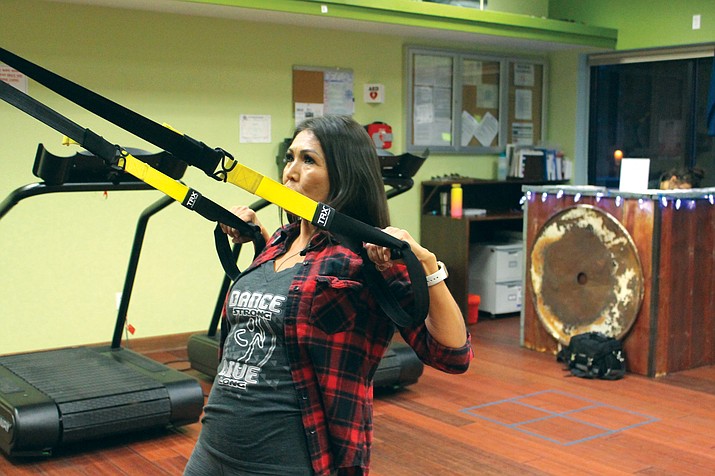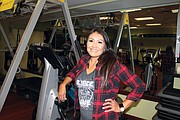Cameron Zumba instructor shares some useful steps to an active lifestyle
FLAGSTAFF, Ariz. — It’s that time of the year again — time to get pumped up and set those new year’s resolutions for healthier eating, fitness and losing some pounds.
Denise McClellan, 42, is a Navajo tribal member from Cameron, Arizona, and has been a certified and licensed fitness and Zumba instructor for more than six years. She lent some advice for setting goals and sticking to them — a task she knows all too well while also being a mother, wife and owner of Native Expressions Navajo Arts and Crafts.
McClellan first suggests writing down your exercise goals so you have a visual plan in place.
“Writing it down makes you commit and you are able to block that specific time off to do your exercise of choice,” she said. “Consistency is key for results. Exercise can be fun and enjoyable; it’s doing the physical activity you like to do.”
In establishing your goals, make them reachable and realistic.
“Start small and gradually increase time. Then when you’re comfortable, increase the duration so you feel accomplished,” she said.
McClellan also said hydration is super important and drinking two liters or more of water is ideal.
“The golden rule for me is to drink water first thing in the morning,” she said. “I use the same rule before and after a workout. I usually drink 20 ounces before my Zumba sessions and after.”
In the past year, her regular exercise regimen consisted of three days of cardio, usually Zumba, and muscle conditioning and two days of strength training.
“This month, I’m adding an extra day of strength training,” she said.
When exercising regularly, recovery and rest time is critical because when you’re feeling muscle soreness, it is actually micro muscle tears that occurred during your exercise.
“For an intense cardio workout, 48 to 72 hours is ideal [for rest],” McClellan explained. “However, a mild walk recovery time is one day. Rest days are super important, your body needs to reset itself because you can over train and cause injury otherwise.”
McClellan also suggests getting adequate amounts of sleep, hydrating and eating a balanced meal are crucial during this time. Studies indicate 80 percent of weight loss is the result of a healthy diet and 20 percent is attributed to exercise.
“A balanced meal is very important, get the adequate amount of protein especially if you’re doing strength training,” she said. “Get an adequate amount of carbohydrates and fibers as well. Make sure your food plate is nice and colorful with greens.”
Meal prepping is also a good habit in order to watch your food intake.
“I meal prep every day, it is time-consuming but eating healthy is a huge part of health and wellness,” she said. “If you can plan your meals out great, if you can’t, it’s a little bit more difficult.”
McClellan said she feels successful because she is doing what she loves to do, to motivate and encourage others to be active.
“The first time I tried a Zumba class, I was hooked,” she said. “Zumba is taught as a group fitness class and all who attend become your family. The social interactions and the fun upbeat music keep the participants coming back.”
“What keeps me exercising is the feeling after,” she said. “After exercising, you have the instant mood boost and a lot of energy. I feel happy, on top of the world and accomplished.”
McClellan explained this feeling after exercise is the body’s increase of “feel mood” neurotransmitters.
“Exercise is good for brain health,” she added. “Physical activity on a regular basis can protect your brain — taking longer for Alzheimer’s, Dementia and the natural aging process from taking effect.”
“Many of us can benefit from simply taking a walk or attending a Zumba class,” she added.
McClellan is doing what she can to encourage others to exercise, be active and live a healthy life in the midst of a diabetes epidemic that plagues many Native American communities across the country.
McClellan does not have diabetes but she knows the epidemic negatively impacts many tribal members.
“Diabetes is preventable with movement. It can be managed using exercise and having a good balanced diet,” she said. “Self-education is super important when it comes to that.”
She recognizes the lack of health and fitness facilities in tribal communities but she said that should not deter anyone from being healthy and active.
“We do have limited fitness facilities but that shouldn’t prevent us from movement,” she said.
McClellan explained there are options for exercise other than in a gym or facility. She suggested body weight exercises, calisthenics, plyometrics, yoga, tai chi, Zumba and many other forms of physical activities that do not require weights or a gym. Even a simple 30 minute walk or run does the job.
“We also have YouTube which offers an unlimited amount of exercise tutorials and sessions that can be done in the comfort of your home,” she added.
She explained consistency and patience is the key.
“Find something that you love to do because there are so many options for exercise,” she said. “Exercise helps with alleviating stress, heart health, blood circulation, lowers blood pressure, helps with brain clarity, mental focus and it helps your body manage blood sugar levels. These are all important as we age.”
Recently, McClellan said she helped with the first-ever research project that studied the effects of exercise within the Native American population. The research, Restoring Balance in Indian Country Physical Activity Program and Study, was conducted by the Partnership for Native American Cancer Prevention.
“I was honored to be part of this study,” she said. “As a lead instructor, our primary role was to lead safe, efficient exercise sessions with research participants while providing exercise education, motivation and supervision.”
Her participation in this study opened her eyes to how exercise impacts cancer patients.
“These are the main reasons I became a certified instructor and personal trainer,” she said. “I care about my Native people, their health and I am determined to continue bringing awareness and education about the importance of physical activity and its benefits while offering fun Zumba classes on and off the reservation.”
McClellan teaches group Zumba classes regularly at the NACA Wellness Center in Flagstaff as a contracted instructor. She also leads a Zumba class for the Health Promotion Diabetes Prevention (HPDP) Program in Tuba City, and has a class once a week in Cameron.
If you want an intense Zumba workout, keep an eye out for McClellan’s next class. You will get your cardio and a full workout in guaranteed.
SUBMIT FEEDBACK
Click Below to:





